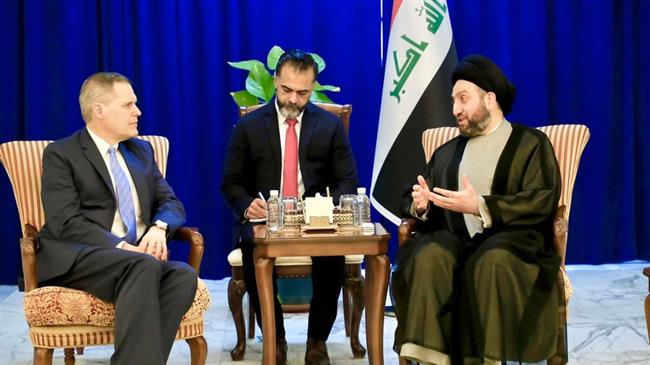Iraq problems must be resolved without any foreign intervention: Hakim
Senior Iraqi Shia cleric and political leader Ammar al-Hakim says problems in the crisis-stricken country must be resolved without any foreign intervention, and that solutions to such troubles must be “indigenous and homegrown.”
Speaking in a meeting with US Ambassador to Baghdad Matthew Tueller on Thursday, Hakim stressed “the need for purely Iraqi solutions to all crises of the country away from any foreign interference.”
The cleric added that the National Wisdom Movement – the opposition political coalition which he leads – is “following on and monitoring the reform steps taken by the government to ensure that the demands of protesters are met.”
جددنا التأكيد على ضرورة أن تكون الحلول عراقية خالصة بعيدا عن التدخلات الخارجية،كما أشرنا خلال لقائنا سفير الولايات المتحدة الأمريكية في بغداد ماثيو تولر إلى أن تيار الحكمة الوطني يتابع الخطوات الإصلاحية التي تقوم بها الحكومة باعتباره تيارا معارضا وصولا إلى تلبية مطالب المتظاهرين. pic.twitter.com/QGdfUiylTw
— Ammar Al-Hakim (@Ammar_Alhakeem) November 14, 2019
Hakim further underlined that peaceful demonstrators must be protected and a safe atmosphere must be provided for them to exercise their constitutional right, adding that those responsible for protester deaths must also be held to account.
Tueller, for his part, claimed that Washington respects the will of the Iraqis and their ability to solve their domestic problems.
The US ambassador also hailed Iraq's highest religious authority Grand Ayatollah Ali al-Sistani for his emphasis on the non-interference of other states in the Arab country’s domestic affairs.
In a statement read out by his representative Abdul Mahdi al-Karbalaei during a sermon in the holy city of Karbala on November 1, Ayatollah Sistani supported the demands of the protesters in the country and warned that no foreign player must impose their will on the Iraqi protesters.
Ayatollah Sistani added that reforms in Iraq must be according to the will of the people of Iraq and not a political party.
He also condemned the violence in Iraq and called on all sides not to pressure the armed forces to crack down on peaceful protesters.
Protesters in Iraq have directed their rage at a class of elite leaders, whom they accuse of pillaging the oil-rich country's wealth while the population grows poorer.
The protests, which began more than a month ago, have often turned violent.
Prime Minister Adel Abdul-Mahdi has vowed that the government and judiciary would continue to investigate the deaths of the protesters, and that all demonstrators who have been arrested in the past several weeks would be released.
According to President Barham Salih, the 77-year old prime minister is willing to resign if parties agree on a replacement.
Earlier this week, Abdul-Mahdi said new electoral reforms would be announced in the “coming few days.”
Iran’s economy grew 2.7% y/y in Sep quarter: CBI
VIDEO | Freelancers in Gaza strive to stay online amid genocide
Mikati demands Israel's withdrawal from south Lebanon
Yemeni army strikes Israeli military sites with drones
‘Clock ticking’: UNRWA slams unjustifiable killing of children in Gaza
BP to be sued in Britain for supplying oil to Israel
VIDEO | Press TV's news headlines
Israeli strikes on north Gaza hospital ‘extremely dangerous, terrifying’: Director



















 This makes it easy to access the Press TV website
This makes it easy to access the Press TV website